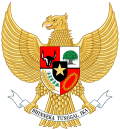Wilopo
Wilopo | |||||||||||||||||||
|---|---|---|---|---|---|---|---|---|---|---|---|---|---|---|---|---|---|---|---|
 Official portrait, c. 1950s | |||||||||||||||||||
| 7th Prime Minister of Indonesia | |||||||||||||||||||
| In office 3 April 1952 – 30 July 1953 | |||||||||||||||||||
| President | Sukarno | ||||||||||||||||||
| Deputy | Prawoto Mangkusasmito | ||||||||||||||||||
| Preceded by | Soekiman Wirjosandjojo | ||||||||||||||||||
| Succeeded by | Ali Sastroamidjojo | ||||||||||||||||||
| |||||||||||||||||||
| |||||||||||||||||||
| |||||||||||||||||||
| Personal details | |||||||||||||||||||
| Born | 21 August 1909 Purworejo, Dutch East Indies | ||||||||||||||||||
| Died | 1 June 1981 (aged 71) Jakarta, Indonesia | ||||||||||||||||||
| Resting place | Tanah Kusir Cemetery | ||||||||||||||||||
| Political party | PDI | ||||||||||||||||||
| Other political affiliations | |||||||||||||||||||
| Spouse |
Sumikalimah (m. 1937) | ||||||||||||||||||
| Alma mater | Rechts Hogeschool (Mr.) | ||||||||||||||||||
| Occupation |
| ||||||||||||||||||
Wilopo (21 October 1909 – 1 June 1981) was an Indonesian politician and lawyer. A capable administrator, he served as
Born into a
Following the recognition of sovereignty in the Dutch–Indonesian Round Table Conference, in which he took part, Wilopo was appointed Minister of Labor by Prime Minister Mohammad Hatta in 1949. He also emerged as a leader in the Indonesian National Party (PNI) and became Minister of Economic Affairs in the Soekiman Cabinet. In 1952, following a foreign policy debacle, the Soekiman Cabinet fell and Wilopo was appointed formateur of a new cabinet by President Sukarno. He opted to form a new cabinet consisting of pro-Western technocrats with unity, a common policy orientation, and the support of the PNI and Masyumi Party, even though both parties were unenthusiastic partners.
As prime minister, Wilopo presided over a
Early life and education
Early life
Wilopo was born in Purworejo, on October 21, 1909.[1] He was born to a modest family in Central Java. His father was a man named Soedjono Soerodirjo, but he was raised by his uncle, a man known as Mantri Guru Prawirodiharjo. He wouldn't know of his real father until he reached adulthood.[2][3] When he was eight years old, he and his family had to move to Loano which is five kilometers from Purworejo. They returned to Purworejo when he was in sixth grade.[4]
Education
Wilopo attended the Holland Inlandse School (HIS). He could have continued his education at the Europese Hogere School (ELS), but he didn't because he wanted to continue his education at the Opleiding School Voor Inlandsche Ambtenaren (OSVIA). After graduating from HIS, Wilopo continued his education at the Meer Uitgebreid Lager Onderwijs (MULO) in Magelang.
After studying at MULO, Wilopo continued his education at
He continued his education at the
He moved to Jakarta and continued his studies at the Rechts Hoge School (RHS). During this time, he lived at the house of Abdul Rasyid, a friend of his from MULO.
Political career
Minister of labour
Wilopo's first government position was as the junior minister of labour during the
Prime minister of Indonesia
After completing his tenure as Minister of Trade and Industry, on 19 March 1952, Wilopo was told to choose a cabinet to lead. Three days after giving his list to President
Post-prime ministership
From 1955 to 1959, Wilopo served as the Speaker of the Constitutional Assembly of Indonesia.[7] He later became head of the Commission of Four, a part of the Corruption Eradication Team, with his service beginning in June 1970.[7][13] Despite finding "corruption everywhere", no actions were taken by the government.[13]
Death and legacy
Wilopo died in Jakarta in 1981.[14] Herbert Feith, an Australian scholar on Indonesian politics, notes that Wilopo was widely considered fair-minded and sympathetic to the plight of the working classes, working carefully towards his goals.[6] As he did not prioritize party loyalty, he was known as being able to cooperate with anyone.[6]
Personal life
During his time in Jakarta, he met Sumikalimah, the younger sister of Abdul Rasyid's mother. Sumikalimah is a teacher at an elementary school. Wilopo began a relationship with Sumikalimah until they got married in October 1917.
References
Citations
- ^ Bahari 2011, p. 35.
- ^ Wilopo 1979, p. 13.
- ^ Nasr, p. 8.
- ^ Wilopo 1979, p. 6.
- ^ Wilopo 1979, p. 18.
- ^ a b c Feith 1958, p. 95.
- ^ a b c d e Bahari 2011, p. 36.
- ^ a b Presidential Library, Wilopo.
- ^ Feith 1958, p. 86.
- ^ Ricklefs 2001, p. 297.
- ^ Feith 1958, p. 90.
- ^ NY Times 1953, Land Issue Ousts.
- ^ a b Ricklefs 2001, p. 360.
- ^ Embree 1988, Wilopo (1909–1981).
Sources
- Bahari, Adib (2011). Pendekar Hukum Indonesia [Indonesian Legal Giants] (in Indonesian). Yogyakarta: Pustaka Yustisis. ISBN 978-979-3411-04-0.
- ISBN 978-0-684-18901-7.
- OCLC 3943883.
- "Land Issue Ousts Indonesia Cabinet; Wilopo, Facing Defeat on His Program by Red-Backed Coalition, Resigns". The New York Times. 3 June 1953. p. 4. Retrieved 11 December 2011.
- "Meninggal dunia jujur dan berkepribadian". Tempo. 31 January 1981. Retrieved 28 September 2021.
- ISBN 978-0-8047-4479-9.
- "Wilopo" (in Indonesian). Presidential Library of Indonesia. Archived from the original on 23 April 2012. Retrieved 10 December 2011.
- Wilopo (1979). Wilopo 70 tahun. Gunung Agung.
- Nasr, Ridho. "Kabinet natsir". Academia.edu.
- McVey, Ruth (1971). "The Post-Revolutionary Transformation of the Indonesian Army". Indonesia. 11 (11): 131–176. JSTOR 3350748.




